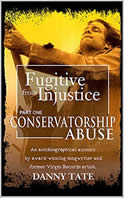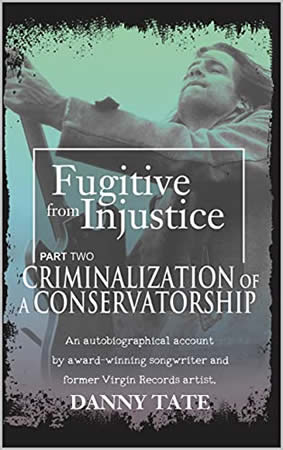Fugitive From Injustice: Conservatorship Abuse by Danny Tate

This is Cane and Abel meets One Flew Over the Cuckoo’s Nest meets Girl With the Dragon Tattoo, but with a guy, and a lot of Shawshank Redemption unredeemed. An autobiographical account focusing on the years subjected to a court ordered conservatorship. The reader will be shocked that this is happening in America today. Without a crime, Danny Tate was forced to live on the lam as a fugitive from justice. About the Author Danny Tate (born November 10, 1955) is an award-winning American musician, songwriter, composer, producer, author and former Virgin Records recording artist. Tate graduated Who’s Who in American Colleges and Universities and is a member of Mensa. In 1989 Governor Bill Clinton appointed Tate “Arkansas Traveler”-Ambassador of Goodwill. NSAI Rock Song of the Year 1998, 1999, 2000. BMI #1 Awards. Multiple Platinum and Gold Records. “Only an artist of rare talent, intelligence, and instinct could achieve the kind of lasting success that Tate has enjoyed”—Vincent Jeffries (VH1.com) “It is dangerous to be right in matters on which the established authorities are wrong.” Danny Tate Danny Tate is an American musician, songwriter, composer, producer, author and former Virgin Records recording artist, best known for penning songs covered by The Smithereens, Tim McGraw, The Fabulous Thunderbirds, Patti LaBelle, Diesel, Billy Ray Cyrus, Doro Pesch, Jeff Healey, Lynyrd Skynyrd, Rick Springfield and many others. Most notably, Tate won the NSAI Rock Song of the Year award for 1998, 1999 and 2000. His start came when he co-wrote the 1983 multi-platinum hit, “Affair of the Heart”, by Rick Springfield. He released three solo albums, Danny Tate Charisma/Virgin (1992), Nobody’s Perfect Charisma/Virgin (1995), and Destination X Noville Records (2005), also composing for television shows, and contributing to the film soundtracks of 3000… Read More




